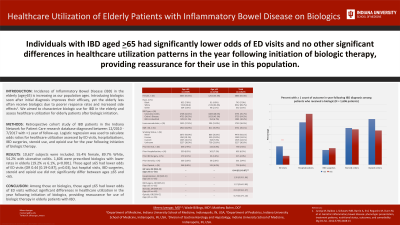Tuesday Poster Session
Category: IBD
P3612 - Healthcare Utilization of Elderly Patients With Inflammatory Bowel Disease on Biologics
Tuesday, October 24, 2023
10:30 AM - 4:00 PM PT
Location: Exhibit Hall

Has Audio
- MI
Meera Iyengar, MD
Indiana University School of Medicine
Indianapolis, IN
Presenting Author(s)
Meera Iyengar, MD1, Wade Billings, MD1, Matthew Bohm, DO2
1Indiana University School of Medicine, Indianapolis, IN; 2Indiana University Hospital, Indianapolis, IN
Introduction: The incidence of inflammatory bowel disease (IBD) in the elderly is increasing as our population ages. The elderly population tends to suffer a more severe initial flare, though biologics are less often used in the elderly due to poorer response rates and more side effects1. Introducing biologics soon after initial diagnosis improves efficacy, yet the elderly are often excluded from randomized control trials for biologics, highlighting the need for more data in this vulnerable population. Our aims were to characterize biologic use for IBD in the elderly population (age >65) and assess healthcare utilization for elderly patients after starting biologics.
Methods: Retrospective cohort study of IBD patients based on ICD9-10 codes, diagnosed between 12/15/10-7/1/17 with >1 year of follow-up using the Indiana Network for Patient Care research database. Age groups were created to evaluate trends in biologic use and outcome by age. Logistic regression was used to calculate odds ratios for ED visits, hospitalizations, IBD surgeries, steroids, and opioids for the year following initiation of biologic therapy.
Results: 10,627 subjects were included. 55.4% were female, 89.7% were White, and 54.2% had Ulcerative Colitis. 1,606 were prescribed biologics with lower rates in the elderly (6.1% vs. 19.2%; p< 0.001). In logistic regression models, individuals age >65 had a significantly lower odds of having ED visits compared to those less than age 65 (OR 0.44 95% CI [0.19-0.87]; p=0.03) (Table 1). Hospital visits, IBD surgeries, steroid orders, and opioid orders did not significantly differ between ages >65 and < 65.
Discussion: Among those on biologics, those age >65 had lower odds of ED visits without significant differences in other healthcare utilization for the year following initiation of a biologic. These findings provide reassurance for the use of biologic therapy in elderly patients with IBD.
1. Juneja M, Baidoo L, Schwartz MB, Barrie A, 3rd, Regueiro M, Dunn M, et al. Geriatric inflammatory bowel disease: phenotypic presentation, treatment patterns, nutritional status, outcomes, and comorbidity. Dig Dis Sci. 2012;57(9):2408-15
Disclosures:
Meera Iyengar, MD1, Wade Billings, MD1, Matthew Bohm, DO2. P3612 - Healthcare Utilization of Elderly Patients With Inflammatory Bowel Disease on Biologics, ACG 2023 Annual Scientific Meeting Abstracts. Vancouver, BC, Canada: American College of Gastroenterology.
1Indiana University School of Medicine, Indianapolis, IN; 2Indiana University Hospital, Indianapolis, IN
Introduction: The incidence of inflammatory bowel disease (IBD) in the elderly is increasing as our population ages. The elderly population tends to suffer a more severe initial flare, though biologics are less often used in the elderly due to poorer response rates and more side effects1. Introducing biologics soon after initial diagnosis improves efficacy, yet the elderly are often excluded from randomized control trials for biologics, highlighting the need for more data in this vulnerable population. Our aims were to characterize biologic use for IBD in the elderly population (age >65) and assess healthcare utilization for elderly patients after starting biologics.
Methods: Retrospective cohort study of IBD patients based on ICD9-10 codes, diagnosed between 12/15/10-7/1/17 with >1 year of follow-up using the Indiana Network for Patient Care research database. Age groups were created to evaluate trends in biologic use and outcome by age. Logistic regression was used to calculate odds ratios for ED visits, hospitalizations, IBD surgeries, steroids, and opioids for the year following initiation of biologic therapy.
Results: 10,627 subjects were included. 55.4% were female, 89.7% were White, and 54.2% had Ulcerative Colitis. 1,606 were prescribed biologics with lower rates in the elderly (6.1% vs. 19.2%; p< 0.001). In logistic regression models, individuals age >65 had a significantly lower odds of having ED visits compared to those less than age 65 (OR 0.44 95% CI [0.19-0.87]; p=0.03) (Table 1). Hospital visits, IBD surgeries, steroid orders, and opioid orders did not significantly differ between ages >65 and < 65.
Discussion: Among those on biologics, those age >65 had lower odds of ED visits without significant differences in other healthcare utilization for the year following initiation of a biologic. These findings provide reassurance for the use of biologic therapy in elderly patients with IBD.
1. Juneja M, Baidoo L, Schwartz MB, Barrie A, 3rd, Regueiro M, Dunn M, et al. Geriatric inflammatory bowel disease: phenotypic presentation, treatment patterns, nutritional status, outcomes, and comorbidity. Dig Dis Sci. 2012;57(9):2408-15
Disclosures:
Meera Iyengar indicated no relevant financial relationships.
Wade Billings indicated no relevant financial relationships.
Matthew Bohm indicated no relevant financial relationships.
Meera Iyengar, MD1, Wade Billings, MD1, Matthew Bohm, DO2. P3612 - Healthcare Utilization of Elderly Patients With Inflammatory Bowel Disease on Biologics, ACG 2023 Annual Scientific Meeting Abstracts. Vancouver, BC, Canada: American College of Gastroenterology.

